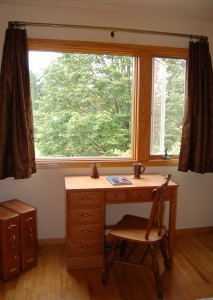
My Journaling Desk
Does proximity to nature enhance creativity? In September on The Studio with Cheryl on KRUU I interviewed three authors whose preferred writing spaces connect them with the outdoors. Cartoonist Francesco Marciuliano’s pet poetry books (like I Knead My Mommy and Other Poems by Kittens) appear on many best-seller lists. His first-floor New York City apartment boasts a small, private backyard. Weather permitting, Francesco writes there. Outside, under the shade of an umbrella, he sits at a small table in an Adirondack chair.
Standup comic and internationally known performance poet, June Melby recently penned a memoir: My Family and Other Hazards details her family’s years running a hand-crafted but unprofitable miniature golf course near Waupaca, Wisconsin. From her writing desk, June sees the woods surrounding her Decorah, Iowa log cabin.
Oral historian Esther Ehrlich’s Richmond, California home borders a large park filled with deer, foxes, and hawks. Tucked into a corner of her bedroom, her writing space consists of a shelf-like slab of wood positioned below two huge windows. Esther’s view includes a ravine, trees, a creek, birds, and wildlife. “It’s a very peaceful place for me to write,” Esther told me, adding that she wrote her whole book (Nest, her first historical novel) sitting right there.
In his nonfiction book Thrive, author Dan Buettner praised flow rooms, spaces in Danish homes designed to encourage families to cultivate the arts. I may never have a flow room. I may never succeed in making all my home’s rooms the tidy, nurturing spaces I want them to be. Thanks to the inspiration of people I’ve interviewed, though, I have created a flow niche.
During my teens, my parents bought a solid-maple vanity for my bedroom. After they died, I took it home to Iowa. At my request, my husband recently detached the heavy mirror from its back, and now the vanity fits perfectly under our bedroom’s north window. With a vintage chair of my mother’s beside it, the vanity feels desk-like. The north light draws me to it, maybe because it deepens the patina of use emanating from the vanity, the chair, and two old suitcases my husband kept to remind him of his father. Sitting at the vanity, I see a stretch of sky, a gravel road, and trees, now mature, that my husband planted.
Tiny as it is, this space comforts me in ways I can’t explain. Journal writing is effortless here. Breezes from the window, the chirpings of crickets and birds, the daily deer sightings—these simple sensory impressions quiet my jumbled thoughts. In this small space, I feel connected not just to nature, but to the inner me, my creative self, and also to loved ones now gone.